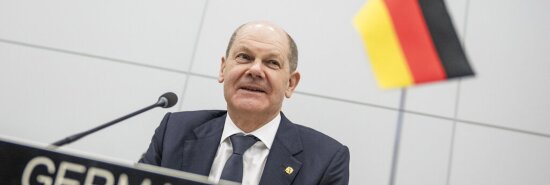
Two reasons Biden must publicly pressure Germany’s Olaf Scholz at the White House
Tom Rogan
Standing beside President Joe Biden at the White House on Friday, German Chancellor Olaf Scholz should find himself subject to Biden’s polite but public pressure.
The need for that public pressure is twofold. First, Scholz’s government is failing to deliver on pledged and long overdue boosts to defense spending. Second, by situating German foreign policy in service of China’s long-term foreign policy strategy, Scholz is greatly undermining the U.S.-led democratic international order. An order, it should be noted, from which Germany has gained near unmatched benefits since 1945. If he continues on this path, Scholz’s legacy will match that of his predecessor, Angela Merkel. Leaving office in 2021, Merkel was justifiably lauded by both Beijing and Moscow for her sixteen years of faithful service to their interests. The U.S.-German alliance probably cannot survive another Merkel.
Let’s start with defense spending.
Following Russia’s February 2022 escalated invasion of Ukraine, and headlined under a so-called Zeitenwende, or “turning point” strategy, Scholz pledged $106 billion in new investments to put Germany on a rapid path to meet NATO’s 2%-of-gross domestic product minimum defense spending target. This followed more than a decade of Germany’s stunning neglect of its responsibilities to the NATO alliance. Unfortunately, Scholz’s defense boosts are yet to be seen.
CONGRESS TOLD OF LIKELY CHINESE SPY BALLOON THREAT AS EARLY AS 2019
A major issue is political inertia now that Russian forces are being annihilated in Ukraine. But unless Germany is willing to become a burden-sharing NATO ally, it can no longer be considered a credible American ally. Russia will likely reconstitute its forces and pose a future threat to NATO. Underlined by the growing reticence of Republican politicians and voters to carry the weight of Europe’s defense, however, Biden no longer has the luxury of quiet, private nudges for Scholz to do more. To his credit, Biden recently sent a symbolic message to this effect by staying in Poland during his recent trip to Europe while sidestepping Berlin, Brussels, and Paris. That was a polite way of saying, “We have to prioritize partners like Poland that can be relied upon.”
The China factor bears additional weight to this defense spending concern.
After all, contrary to the Biden administration’s delusional and dangerous assertion that it can spread U.S. military forces between Europe and the Pacific with tolerable risk in both theaters, the U.S. military must now prioritize its Pacific readiness. In turn, Germany must step up its European defense commitments along with other continental powers (we shall see if France’s recent pledge to boost defense spending comes to fruition) so that the U.S. military can redeploy forces from Europe in readiness for a likely coming war over Taiwan.
Yes, the U.S. Army can and should retain a sizable footprint in Europe, perhaps relocating some bases from Germany to Poland. Yes, U.S. nuclear forces should remain within ideal striking range of Russia. But when it comes to Air Force fighter and bomber units and Navy destroyers and attack submarines, Indo-Pacific Command must get whatever it wants, which is to say nearly everything. The forward deployment of these units to Europe boosts their short-term readiness and operational experience, but worsens already unacceptable long term maintenance delays. The U.S. will lose a war with the People’s Liberation Army if its personnel are exhausted and its capabilities are queuing up outside the repair depots.
At the White House press conference on Friday, Biden should thus say something along the lines of: “The U.S. expects that Germany will live up to its pledge as our strongest European economic partner to become one of our strongest defense partners. As we look to strengthen our historic bonds with Europe, the U.S. will have to prioritize relations with nations that share our willingness to meet the challenges of the moment.”
Next up, Scholz’s deferential stance toward Beijing.
The key concern here: As with Merkel, Scholz views Germany’s relationship with China as an economic-political transaction. It’s a deal with a dragon. In return for Germany’s relative silence on controversial matters such as China’s policies toward Taiwan and Hong Kong, China offers German car manufacturers privileged access to its markets. China also gets to take control of elements of Germany’s critical infrastructure. But the primary U.S. concern over the Sino-German relationship is how Chinese President Xi Jinping is using it to degrade the traditional trans-Atlantic alliance.
Xi wants to split the European Union from the U.S. on matters related to China, thus obstructing a global democratic alignment against his various aggressions. This matters because the EU will generally follow where Germany leads, if only for financial reasons — and because the most effective way to deter China from doing things like invading Taiwan, stealing the world’s intellectual property, and building a massive nuclear arsenal is to make Beijing realize that those actions carry a price tag of global isolation. Yet, as with his tolerance for China’s ludicrous claim that it doesn’t support Russia over Ukraine, for example, Scholz has shown a willingness to turn a blind eye to Xi’s duplicity.
Scholz has legitimate complaints in relation to Biden’s protectionist Inflation Reduction Act (although the entirely protectionist France does not). Were he willing to make substantive changes to his China policy, Scholz would be due U.S. concessions under the new U.S. law.
Still, the top line is that Biden no longer lacks the room for polite pressure in private. The time has come for polite pressure in public. If not, and if only with the next U.S. president, the U.S.-German alliance will be in big trouble.
